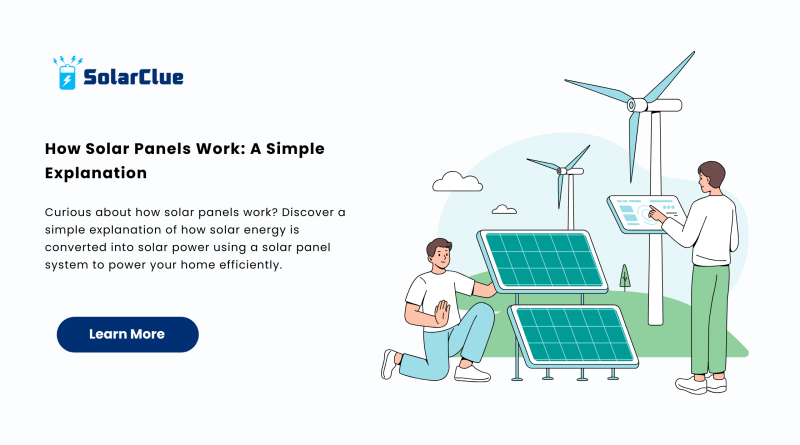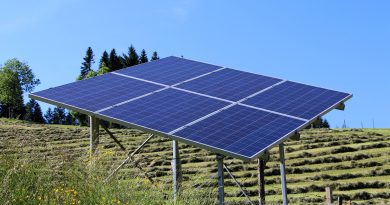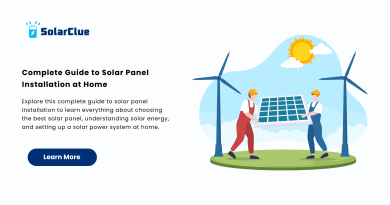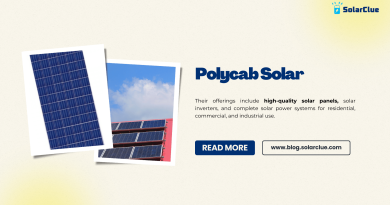How Solar Panels Work: A Simple Explanation
In today’s world, where sustainable energy is becoming a necessity, many people are switching to solar power to reduce electricity costs and carbon emissions. But have you ever wondered how solar panels work? In this blog, we’ll break down the process in the simplest terms possible—so you’ll walk away with a clear understanding of how solar energy turns into usable electricity for your home or business.
Table of Contents
- 1 What is Solar Energy?
- 2 What is a Solar Panel?
- 3 Step-by-Step: How Do Solar Panels Work?
- 4 Components of a Solar Power System
- 5 Benefits of Using Solar Energy
- 6 Common Myths About Solar Panels
- 7 How Efficient Are Solar Panels?
- 8 Factors That Affect Solar Panel Performance
- 9 Is Solar Power Right for You?
- 10 FAQs
- 11 Conclusion:
What is Solar Energy?
Solar energy is the energy we receive from the sun. It travels in the form of photons (light particles) that carry energy to Earth. When these photons hit certain materials—like the silicon found in most solar panels—they can generate electricity through a process called the photovoltaic effect.
What is a Solar Panel?
A solar panel is a device that captures sunlight and converts it into electricity. These panels are made up of smaller units called solar cells, which are typically made from silicon. A collection of these panels makes up a solar power system that can power anything from lights and fans to entire homes and offices.
Step-by-Step: How Do Solar Panels Work?
Let’s simplify the science. Here’s how a typical solar power system works:
1. Sunlight Hits the Solar Panels
When sunlight hits the solar panel, the photovoltaic (PV) cells absorb the light energy. The stronger the sunlight, the more energy is absorbed.
2. The Photovoltaic Effect Begins
Inside the PV cells, light energy excites the electrons in the silicon, causing them to move. This movement creates direct current (DC) electricity.
3. Inverter Converts DC to AC
Since your home uses alternating current (AC), the DC electricity from the panels is fed into an inverter. The inverter’s job is to convert this into AC electricity, which you can then use to power your home appliances.
4. Powering Your Home
The converted AC electricity is then sent to your home’s electrical panel (also called a breaker box). From here, it’s distributed to your lights, fans, TV, ACs, and other appliances.
5. Excess Power Goes to the Grid or Battery
If your solar power system produces more energy than you consume, the extra electricity is either stored in a solar battery or sent back to the utility grid. Thanks to net metering, you may even earn credits on your electricity bill for the excess power you generate.
Components of a Solar Power System
To understand how solar panels work, it’s helpful to know the key parts of a typical solar power system:
Solar Panels
Capture sunlight and generate electricity.
Inverter
Converts DC electricity to AC.
Mounting Structure
Holds the panels in place, usually on rooftops.
Battery (Optional)
Stores excess electricity for later use.
Charge Controller (if off-grid)
Regulates the voltage and current to prevent battery overcharging.
Meter
Tracks the amount of electricity produced and consumed.
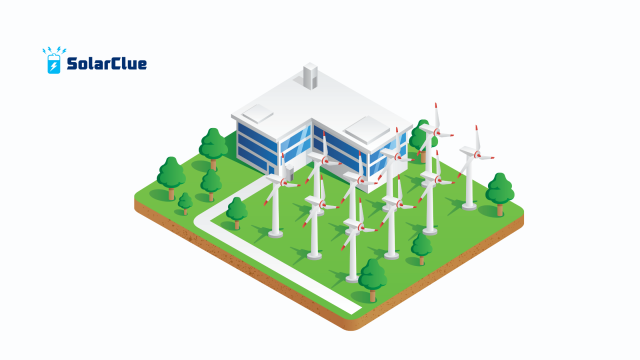
Benefits of Using Solar Energy
Choosing solar energy is not just about saving money—it’s about creating a sustainable future.
1. Lower Electricity Bills
You generate your own electricity, reducing your monthly utility expenses.
2. Eco-Friendly
Using the sun as an energy source reduces your carbon footprint and helps fight climate change.
3. Energy Independence
With your own solar power system, you’re less dependent on the grid and electricity price fluctuations.
4. Low Maintenance
Solar panels require minimal upkeep—just keep them clean and inspected.
5. Long-Term Investment
Once installed, solar panels can serve you for over 25 years with consistent performance.
Common Myths About Solar Panels
“Solar Panels Don’t Work in Cloudy Weather”
False. While output reduces, solar panels still generate electricity even on cloudy days.
“Solar Power is Too Expensive”
Thanks to falling prices and government subsidies, solar is more affordable than ever.
“Maintenance is a Hassle”
In reality, solar panels require very little maintenance and no moving parts.
How Efficient Are Solar Panels?
The efficiency of a solar panel refers to how much sunlight it can convert into electricity. Most commercial solar panels offer 15–22% efficiency. While this may sound low, it’s more than enough to power your home when scaled properly with the right number of panels.
Factors That Affect Solar Panel Performance
1. Location and Sunlight
The more direct sunlight your panels receive, the more electricity they produce.
2. Angle and Orientation
Tilting your solar panels at the right angle improves efficiency.
3. Shading
Trees or tall buildings can reduce sunlight exposure and lower energy output.
4. Temperature
High temperatures may reduce solar panel efficiency slightly, even if it’s sunny.
Is Solar Power Right for You?
If you live in a location with good sun exposure and want to reduce your energy costs and carbon footprint, a solar power system can be an excellent investment. Many state and central governments in India also offer subsidies and tax incentives to encourage solar adoption.
FAQs
Q1. How long do solar panels last?
Most solar panels come with a warranty of 25 years and can last even longer with proper care.
Q2. Can I use solar power at night?
Not directly. You’ll need a battery system to store power for nighttime use, or rely on grid power during the night.
Q3. Is solar energy really free?
The sunlight is free, but there is an upfront investment for solar panels and installation.
Q4. Can solar panels power an entire home?
Yes, if your solar power system is sized correctly based on your home’s energy needs.
Q5. What happens during power cuts?
If you’re connected to the grid without batteries, your system shuts off for safety. Battery systems can provide backup power.
Conclusion:
Now that you understand how solar panels work, you can make a more informed decision about switching to clean and efficient solar energy. With a good solar power system, you can reduce costs, support sustainability, and enjoy long-term energy independence.
Ready to explore more? Discover reliable brands, personalized guidance, and expert advice only at solarclue.com and blog.solarclue.com. Your solar journey starts here!

